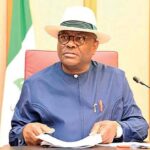Germany and Nigerian public policy think tank, Nextier, have explored the evolving landscape of German-Nigerian cooperation, focusing on economic growth, security, climate resilience, and investment opportunities.
The discussion was featured in the latest episode of Nextier’s Crossing Perspectives podcast, where Nextier’s Managing Partner, Dr. Ndu Nwokolo, engaged with the Deputy Head of Mission at the German Embassy in Nigeria, Ambassador Johannes Lehne.
Lehne noted Germany’s longstanding partnership with Nigeria and the country’s improving economic climate, attributing it to the reforms introduced by President Bola Tinubu.

“Inflation is decreasing, foreign exchange reserves are stabilising, and oil production is picking up,” he said.
He observed that German companies are showing increased interest in Nigeria, reflecting growing confidence in the business environment.
He added that Germany’s approach to development aid in Nigeria is shifting from crisis management to investment and business promotion.
“We will put more investment into the country. We will shift from crisis management to promoting businesses,” he stated, while also reaffirming Germany’s commitment to bolstering Nigeria’s defence sector.
According to him, Germany has already established a military support programme with the Nigerian Armed Forces and is likely to increase its assistance. He also highlighted Germany’s role in strengthening ECOWAS’ counterterrorism capabilities by providing mobile headquarters, hospitals, and logistics infrastructure.
On concerns over potential budget cuts in climate resilience, food security, and gender-related initiatives, Lehne reassured that funding remains intact.
“The Green Party in Germany secured €100 billion for climate, resilience, and gender programs. As the United States reduces its aid footprint, Germany will step in to fill the gap,” he said.
Germany, he added, will maintain its active development cooperation through GIZ, focusing on energy, agriculture, and job creation, including expanding the African Power Program for regional electricity integration.
On migration, Lehne acknowledged the desperation that pushes young Nigerians to seek illegal routes abroad but warned against the dangers of human trafficking networks.
“Don’t do it. It’s highly dangerous. Criminals exploit migrants, and the journey is filled with risks,” he cautioned.
Instead, he noted that Germany is working on a legal migration agreement with Nigeria to create structured opportunities for skilled workers.
Lehne also highlighted Germany’s investment in Nigeria’s energy transition and infrastructure development, citing projects such as the West African Power Program, which aims to integrate electricity networks across the region.
Regarding Nigeria’s critical minerals sector, he revealed that German companies have begun exploring opportunities, conducting satellite mapping of resources, and engaging with state governments.
However, he stressed that security and energy infrastructure must improve to attract sustainable foreign investment.
The discussion also addressed challenges facing ECOWAS, particularly the withdrawal of Burkina Faso, Mali, and Niger. Lehne compared the situation to Brexit, stating that ECOWAS must decide whether to tolerate military rule or uphold democratic values.
“Countries cannot cherry-pick benefits without sharing responsibilities,” he said.
With an upcoming transition in the German government, he predicted heightened defence investments due to global security concerns.
He noted that Germany recently strengthened military cooperation with Nigeria through a $2 million defence support programme for 2025–2026 while continuing its counterterrorism support for ECOWAS.










